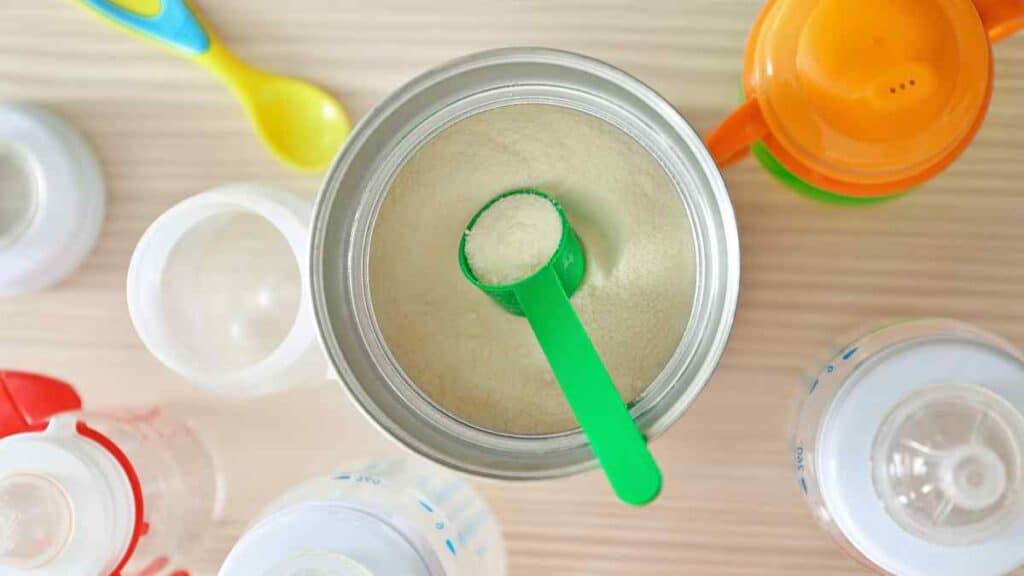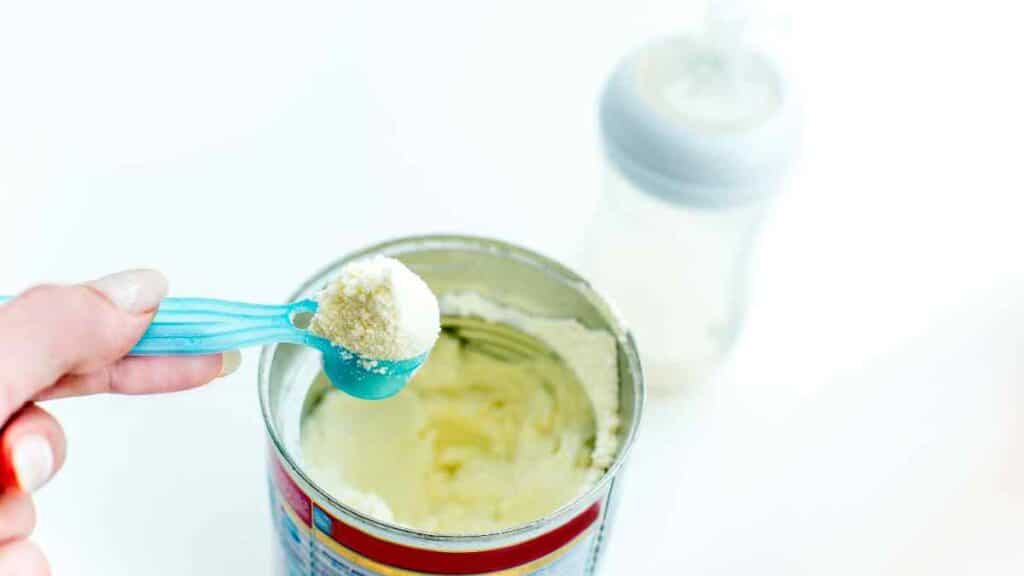Choosing between all the available organic formula these days is a huge decision every parent must make. After all, with so many options available, it can be challenging to determine which is the best one for your child.
Now that you’ve decided to choose baby formula over breast milk, it’s time to determine which product is best. To make the process easier, let’s help you decide which is ideal for your baby’s sensitive stomach.
Enfamil Gentlease Infant Formula and Neuropro Sensitive soothe a baby’s delicate stomach. They provide the complete nutrition necessary for growth. However, each formula product uses distinct methods to achieve this goal.
Let’s take a closer look at each product’s features, pros and cons, and the primary differences between Enfamil NeuroPro Sensitive formula and Gentlease formula to help you find the best one for your baby.

All Baby Formula Brands are Safe for Consumption
Breast milk is still the most highly advisable choice, as advised by experts, especially during the first six months of age. But with so many factors to consider, there are times when breast milk may not be an option for a parent. Providing complete nutrition through baby organic formula is a practical way to promote optimum baby growth.
It’s always helpful to speak with a pediatrician to get recommendations, primarily if your baby has specific needs. But generally speaking, all baby formula companies sold in the country are safe to use. Infant formulas go through the regulations set by the U.S. Food and Drug Administration to ensure that it meets the minimum nutritional requirements of the Federal Food, Drug, and Cosmetic Act [1].
It means that all major formula companies and products, such as Enfamil Gentlease infant formula, Similac Pro Sensitive, Enfamil Nutramigen, and Similac Sensitive, to name a few, are safe to use and will certainly meet your baby’s nutritional needs.
Primary Forms of Baby Formulas
Every infant organic formula differs and often depends on the baby’s specific needs. When it comes to feeding babies, there are three primary types of baby formula: powder, liquid concentrate, and ready-to-use. Each type has its benefits and drawbacks, and choosing the right one for your baby’s needs is essential. Let’s take a closer look at each form of infant formula to help you choose which is best for your baby.
Powdered Infant Formula
A powdered organic formula is the most commonly used type of formula. It’s easy to store and transport and the most affordable option. However, it requires mixing with water, which can be a hassle, especially when traveling.
Liquid Concentrate Infant Formula
Liquid concentrate formula is more concentrated and requires mixing with an equal amount of water. It’s less time-consuming than powdered formula and easier to measure than ready-to-use formula. However, it’s slightly more expensive than powdered formula.
Ready-to-use Infant Formula
Ready-to-use formula is the most convenient form of baby formula as it requires no preparation. It’s the easiest option to use when you’re out and about, and it’s ideal for parents who don’t have access to clean water. However, it is the most expensive type of baby formula and must be consumed quickly after opening.
Similac Sensitive vs. Enfamil Gentlease Formulas
Now that we’ve covered the primary forms of baby organic formula, let’s take a closer look at two popular options: Similac Sensitive and Enfamil Gentlease formulas. As parents, it can be overwhelming to choose the right formula for our little ones, especially if they have sensitive tummies or other feeding challenges. Let’s compare and contrast these two formulas to help you decide which one might best fit your baby’s needs. Let’s dive in.

Similarities Between Similac Sensitive vs. Enfamil Gentlease
Similac Sensitive and Enfamil Gentlease are baby formulas developed for gentler digestion. They provide relief for babies with sensitive tummies. While there are differences between the two, they also share many similarities.
- Both formulas are partially hydrolyzed, which is a significant similarity. This makes the proteins easier to digest by breaking them into smaller pieces, reducing the likelihood of digestive issues for babies. Both Similac Sensitive and Enfamil Gentlease contain partially hydrolyzed whey protein.
- Another similarity between these formulas is that they both contain lactose. Lactose, as the primary carbohydrate in breast milk, serves as an essential energy source for babies. While some babies with lactose intolerance may not tolerate lactose, most babies with sensitive tummies can handle it in small amounts.
- Additionally, manufacturers design both formulas to be gentle on a baby’s digestive system. They use a gentler formula to ease digestion and help reduce gas, bloating, and fussiness.
Finally, Similac Sensitive and Enfamil Gentlease are both widely available at most major retailers, making them accessible to parents across the country.
Main Differences Between Enfamil Gentlease vs. Similac Sensitive
Both formulas share many similarities, yet they also have key differences. Parents should note these differences when choosing a formula for their little ones. This column will explore the main differences between Enfamil Gentlease vs. Similac Sensitive.
- First, let’s take a look at the ingredients. Enfamil Gentlease contains partially hydrolyzed nonfat milk and whey protein concentrate solids, while Similac Sensitive contains milk protein isolate and whey protein concentrate. Enfamil Gentlease also includes a blend of prebiotics, which can help support digestive health. Similac Sensitive contains a blend of nucleotides, which can help support the immune system.
- Another difference between these two formulas is the texture. Enfamil Gentlease is slightly thicker than Similac Sensitive, which some babies may prefer. However, this can also make mixing more difficult and lead to clogged bottle nipples. Similac Sensitive, conversely, has a thinner texture and is easier to mix.
- Price is also a factor to consider. Enfamil Gentlease is generally more expensive than Similac Sensitive but may also provide more value regarding the added prebiotics and other nutrients.
- Finally, it’s worth noting that some babies may prefer the taste of one formula over the other. It’s not uncommon for babies to reject one formula but accept another, so finding the right formula for your little one may be a matter of trial and error.
What To Look For When Searching For A Sensitive Formula
If you’re a parent searching for a sensitive formula for your little one, navigating the numerous options on the market can be overwhelming. In the previous column, we compared Enfamil Gentlease vs. Similac Sensitive and highlighted some key differences between the two formulas. However, there are many other factors to consider when choosing a sensitive formula for your baby.
Ingredients
One crucial factor to consider is the ingredients. Ideally, a sensitive formula should contain ingredients like breast milk, such as whey and casein proteins. You should also look for formulas free of artificial growth hormones and high fructose corn syrup, which can be hard on a baby’s sensitive digestive system.
Hypoallergenic Component
Another consideration is whether to opt for a hypoallergenic formula. These formulas are designed for babies with severe allergies or intolerances and contain proteins broken down into smaller pieces to make them easier to digest. Similac Sensitive is an example of a hypoallergenic formula that can be a good choice for babies with sensitive stomachs.
Organic Sources
Organic formula are also becoming increasingly popular among parents. These formulas are made with organic ingredients and are free of pesticides and other harmful chemicals. If you’re looking for a sensitive organic formula, you may want to consider a milk protein isolate-based formula or choose a breast milk bank near your area.
Individual Needs
It’s also important to consider your baby’s individual needs and preferences. Some babies may do better with a particular brand or type of formula, while others may react adversely to it. Finding the right sensitive formula for your little one may take some trial and error.

Alternative Infant Formulas
If you’ve been searching for a sensitive formula for your baby, you may have come across options like Similac Sensitive and hypoallergenic formulas. But did you know that alternative infant formulas are also available for babies with different dietary needs? In this column, we’ll look closer at lactose-free formulas, reduced lactose formulas, hypoallergenic formulas, and dairy-free formulas.
Lactose-Free Formulas
For babies who are lactose intolerant or have trouble digesting lactose, lactose-free formulas can be a good option. These formulas are made with corn syrup or glucose syrup solids instead of lactose. However, it’s worth noting that some lactose-free formulas may contain high fructose corn syrup, a controversial ingredient due to its potential health risks.
Reduced Lactose Formulas
Reduced lactose formulas contain less lactose than regular formulas, which can be helpful for babies who are sensitive to lactose but don’t require a completely lactose-free formula. These formulas are typically made with milk protein isolate, a more easily digestible form of milk protein.
Hypoallergenic Formula
Hypoallergenic formulas are designed for babies with allergies or intolerances to cow’s milk protein or soy protein. These formulas are typically made with extensively hydrolyzed protein, which means the protein has been broken down into smaller pieces that are less likely to cause an allergic reaction. Some hypoallergenic formulas are also free from artificial growth hormones and corn syrup.
Dairy-Free Milk Formula
Dairy-free formulas are made with non-dairy ingredients like soy, rice, or almond milk. These formulas are good for babies with milk allergies or lactose intolerance. However, it’s important to note that some dairy-free formulas may contain added sugars or other ingredients that aren’t ideal for babies.
Organic Formula
Organic formula are also popular for parents looking for a formula free from artificial ingredients, hormones, and pesticides. While organic formulas aren’t specifically designed for babies with sensitive tummies, they can be a good option for parents who want to minimize their baby’s exposure to potentially harmful ingredients.
What Age Do Babies Grow Out of Gassiness and Fussiness?
As we’ve explored a few basic alternative infant formulas, various options exist for parents seeking formulas for babies with sensitivities or digestive issues. However, even with the right formula, some babies may still experience gassiness and fussiness, which can be a source of stress for parents. In this column, we’ll discuss when babies typically grow out of gassiness and fussiness and what parents can do to help ease their babies’ discomfort.
Gassiness and fussiness are common in babies, and it’s unclear what causes them. Sometimes, it may be due to lactose sensitivity, which can cause discomfort and digestive issues when babies consume lactose, a type of natural sugar found in milk-based formulas. This is why some parents opt for lactose-free formulas or sensitive formulas that contain easy-to-digest proteins or corn syrup instead of lactose.
In more severe cases, pediatricians may recommend Enfamil Nutramigen, a hypoallergenic formula designed for babies with severe milk protein allergies. However, for most babies, gassiness and fussiness are normal for their development and tend to subside as their digestive systems mature.
Most babies will grow out of gassiness and fussiness by the time they are three to four months old as their digestive systems become more efficient at processing milk. However, every baby is different; some may take longer to outgrow these symptoms.
Factors To Consider In Choosing A Sensitive Formula
In the previous column, we discussed when babies typically grow out of gassiness and fussiness. However, finding the right formula can be a game-changer for some babies with lactose sensitivity or acid reflux. Similac Sensitive and Enfamil Gentlease are popular options, but what factors should parents consider when choosing a sensitive formula?
- First and foremost, it’s vital to look for a lactose-free formula or one that contains easy-to-digest proteins. Similac Sensitive, for example, is a lactose-free formula that uses milk protein isolate and whey protein concentrate instead. Enfamil Gentlease uses partially hydrolyzed nonfat milk and whey protein concentrate solids, which are also easier to digest than whole proteins.
- Next, ensuring the formula contains all the vitamins and nutrients your baby needs to grow and thrive is essential. Both Similac Sensitive and Enfamil Gentlease are formulated to provide all the necessary nutrients for your baby’s development. Still, it’s always a good idea to check the label and consult with your pediatrician.
- Another factor to consider is the fat and protein blend in the formula. Enfamil Gentlease, for example, has a unique fat protein blend designed to reduce gas and fussiness. Similac Sensitive also has a blend of nutrients that can help support a baby’s immune system.
- Finally, it’s worth noting that every baby is different, and what works for one may not work for another. If your baby is still experiencing symptoms despite trying a sensitive formula, it may be worth consulting with your pediatrician to rule out any underlying medical conditions.

Conclusion
Choosing the right baby formula can be overwhelming, especially if your little one has a sensitive tummy. Enfamil Gentlease and Similac Sensitive are two popular options, each with its own set of benefits and drawbacks. By considering the ingredients, texture, price, and your baby’s needs, you can decide which formula is right for your baby.
Organic formula have become increasingly popular among parents who want to provide the best nutrition for their little ones. While both Enfamil Gentlease and Similac Sensitive are not certified organic, they are formulated to provide all the necessary vitamins and nutrients for your baby’s growth and development.
Ultimately, deciding which formula to choose comes down to what works best for your baby. Feel free to try different formulas or consult your pediatrician if your baby is still experiencing discomfort. With patience and experimentation, you can help your baby thrive and grow strong with the right formula.
If you have any questions, please let me know in the comments below.



